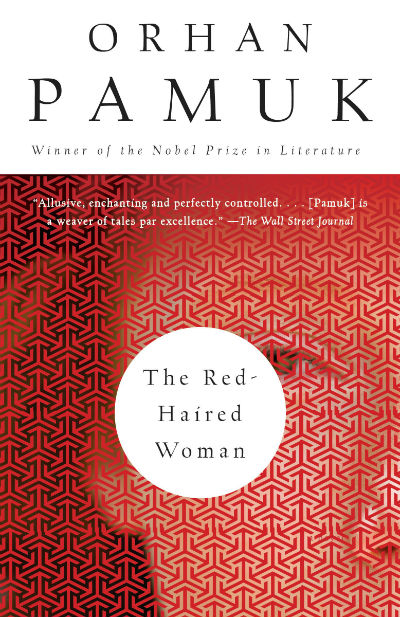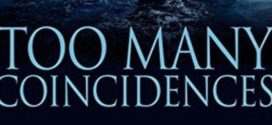There is not much left to be said about credentials of Orhan Pamuk after the fact that he won the Nobel prize for literature in the year 2006. Usually, the Nobel laureates are recognised as an icon that represents their country and culture. We like to explore such writers and their works to understand their similarities and differences with the Indian culture.
To know more about him, you can visit his official website at:
Orhan Pamuk is from Istanbul, and most of his writings have been in Turkish, until the international recognition made the translations of his work available in English. Now it is not always very easy to translate something that has a fair amount of cultural context and so it was with a bit of caution that we approached his books. But, the brilliance of his work comes across even in English and since we like it, we are going to be sharing our views on his books with you, starting with one his latest fictional work published in 2017, a novel called The Red Haired Woman.
| Book Title | : | The Red-haired Woman |
| Author | : | Orhan Pamuk |
| Publisher | : | Penguin; (17 Aug 2018) |
| # of Pages | : |
1622 KB 272 (Kindle EBook) 219 (Paperback) 272 (Hardcover) |
| Purchase Link(s) | : |
Let us take a look at the cover page of the book:

Red Haired Woman by Orhan Pamuk | Book Cover
As you can see, the cover page shows the face of a beautiful woman with red hair and a painted, alluring mouth, but not her eyes. There is a significance to this cover page image and its original inspiration is also mentioned in the book. There is also a para on how some women choose their personalities and how they are judged by men based on it. While in the West, red hair denotes a fiery temper, self-confidence, and mystique, in Turkey, a red-haired woman is considered ‘Easy’, for want of a better word.
This Is Here In For You
Book Plot:
We are told the story, even before the story starts. The prologue simply reads as below:
The book is narrated in first person – mostly by Cem, starting from his adolescence when his father leaves him and his mother. Although the separation is caused by Police pursuing the radical and communist thinkers of the country, the father never returns to Cem and his mother, even after his jail term is over. Driven to poverty, Cem and his mother seek shelter with some relatives.
It is here that Cem meets Master Mahmut, an established well-digger, who takes him on as an apprentice for his next job. And so Cem ends up in Ongoren (a military post town outside Istanbul), with Master Mahmut and another apprentice Ali.
While it may be inconceivable today to think of one person digging a well in search of water with nothing but a pickaxe and shovel, while two young boys haul out the debris with a makeshift winch mechanism, it was very common before the powered drilling rigs started boring wells in our backyards.
There is hard work during the day, but then there are magical nights and evenings, when under the canopy of blinking stars, Master Mahmut, and Cem tell each other stories. The boy is clearly looking for a father figure in his master now, although he resents the hold Master Mahmut has over him.
And it is also here that Cem’s adolescent heart finds the first love, in a Red- haired Woman, who stars in the little theatre enacting tales of morality. Operating from a run-down tent, mostly for the benefit of the soldiers, the entertainment they provide is not exactly what artists dream of, but it has its moments.
Confused, in love, aching, disappointed – all at one time or another, Cem also meets tragedy and heart-break here for the first time… He runs away rather than facing consequences of his actions…..If he believed nothing bad had happened, maybe nothing bad would have happened.
We follow Cem’s life as it unfolds, appearing to be perfectly ordinary for all outward appearances. He does extremely well at University and obtains a degree as a Geological engineer, gets married, leads a relatively quiet and successful life. The only sorrow being the lack of children in his marriage. But this also leads to a closer bond between him and his wife Ayse.
No matter how much he may run for it, he has never gotten over the loss of his father, and the relationship between fathers and sons still hold a fascination over him. He starts following the ancient Greek and Turkish legends – focusing on mainly the story of Oedipus – that of patricide, and Rostam and Sohrab – that of Filiside.
His political connections lead him to start and prosper through a construction company that takes advantage of the ever-growing face of Istanbul, its gigantic growth as a megacity in a span of a few years. It is through this company’s work that he comes back to Ongoren…..
But as before, nothing waits here for him except the inevitable tragedy that he has been driving towards his entire life…
There are writers who give us a story every few months, create a set of living, breathing characters who appear to live in our own world, are as real as us, feel similar emotions as us, face life as we do and somehow, usually pull it all together in a happy ending. And these are the writers and the stories that we very often turn to in order to wind down or relax at the end of a day of hard work.
But then there are writers who come across in every generation only once or twice. Their work takes a much deeper meaning and resonance for the whole country, they come to symbolize certain aspects of their culture, become a symbol for a school of thought. Their works usually make you focus inwards, urge you to introspection of self and life as we know it. Their readership may be divided amongst those who either love them or hate them, but they are recognised as a literary phenomenon. Orhan Pamuk is part of this elite group, and you understand why once you read how simply he can provide you food for thought through quotes like below:
Thoughts sometimes come to us in words, and sometimes in images. There were some thoughts – such as a memory of running under the pouring rain, and how it felt – that I couldn’t even being to put in words….Yet their image was clear in my mind. And there were other things that I could describe in words but were otherwise impossible to visualise; black light, my mother’s death, infinity…
The central theme is, of course, controversial, but not new to the world. Humans have been asking this questions for thousands of years: Is every father and son capable of killing each other – through either intentionally or unintentionally? – Look at the legends of Abraham and Isaac (Central Asia), Oedipus and his father (Greek), Rustam and Sohrab (Persia and Turkey). Are these just stories, or are they the deep-rooted instincts in human nature that we have been trying to negate through civilisation. The story of Oedipus goes even further and Sigmund Freud derived one of his theories from it called the Oedipal Syndrome. What is fatherhood after all? What does it mean to be a father?
Look at the following paras from the book and the range of thoughts they express:
It seems we would all like a strong, decisive father telling us what to do and what not to do. Is it because it is so difficult to distinguish what we should and shouldn’t do; what is moral and right from what is sinful and wrong? Or is it because we constantly need to be reassured that we are innocent and have not sinned? Is the need for a father always there, or do we feel it only when we are confused, or anguished, when our world is falling apart?
— — — —
The modern man is lost in the chaos of the city. He is, in a way, rendered fatherless. But his search for a father is effectively pointless. For if he is an individual in the modern sense, he will cease to be an individual.
— — — —
A father is a dotting, charismatic figure who will until his dying day accept and watch over the child he sires. He is origin and centre of the universe. When you believe that you have a father, you are at peace even when you can’t see him, because you know that he is always there, ready to love and protect you.
— — — —
It was every master’s duty to love, protect, and educate his apprentice as a father would – for the apprentice would eventually inherit his master’s job. In return, it was the apprentice’s duty to learn from his master, to heed his instructions, and to treat him with due deference. In the relationship was soured by antipathy and defiance, it would injure both parties – just as with an actual father and son…
So the story is not new, but as Pamuk shares with us current affairs, news, events that happen around Cem, we also see that the stories extend to more than one type of relationships and affairs in families, where they are usually shoved under the carpet to keep intact the building block of most societies.
He also very clearly shows how quickly a city is changing around a boy who turns into a man. Cem is no idealistic hero, he is no different than thousands around him who go through the life along similar lines. He has similar feelings of being fatherless and continuous yearning to find a replacement like all the other children from broken families do. It is through his fascination for the myths though, that we learn about the collection of stories by Ferdowsi called Shahnameh, and this becomes a living, breathing character of its own. As Pamuk explains through Cem’s words:
The Shahnameh begins with creation myth and tales of giants, monsters, jinn and demons, but its landscape becomes more recognisable once the narrative shifts to the adventures of mortal kings and brave warriors and stories of how people just like us wrestled with family, life – and the state.
— — — —
The Shahnameh was a compendium of forgotten stories, the lives of kings, sultans and heroes of the past. I felt as if I were simultaneously the hero and the author of some of these accounts.
— — — —
Ferdowsi had read the histories, legends and sagas of other nations; sought out books in Arabic, Avestan and Pahlavi scripts; combined myths with heroic chronicles; religious parables with history and memory; and composed his own monumental epic.
You may know that Turkey sits with one leg in Asia and one in Europe, that it aspires to be part of the European union, and in their continuous efforts to Westernise they also have to lose some of their history. As the Indians lament the disconnection of the modern generation from our old tales, so does the Turkish people mourn the loss of their heritage:
Most Ottoman intellectuals would have had a passing acquaintance with the Shahnameh or at least known some of its stories. But after two hundred years of striving to westernize, no one in Turkey was interested any longer in this profusion of tales.
And it is also not only the loss of the stories, but also the platforms where elders told the stories, when there was abundant time for passing the legends on, when well digging could take months instead of minutes, and when we did not deplete our resources at the scary, lightning speed of the modern times:
From the early 1990’s these technical advances led for a time of to an abundant supply of water in the greener neighborhoods of Istanbul, but soon the underground lakes and aquifers closest to the surface were depleted. By the early 2000s, the only groundwater left in many parts of the city was more than seventy metre below the surface, and it would have been practically impossible to get it simply by digging with two apprentices in people’s gardens, a meter a day, as Master Mahmout used to do. Istanbul and the soil it stood on had been denatured and defiled.
As the story moves, it forces us to think, form opinions, connect the dots between cultures and generations and stop and reflect. It goes to the forbidden places where most writers would not. Throughout the book, you find little gems of quotes:
I am most completely myself when nobody’s watching. When there is no one to observe us, the other self we keep hidden inside can come out and do as it pleases.
— — — —
Childlessness had trained me in melancholy and humility.
— — — —
The terror of being blamed for something even when we have done nothing wrong is a fear that manifest itself only in dreams.
— — — —
Our character is forged not just by our freedoms, but also by the forces of history and memory.
— — — —
If you think of consequences, you can’t be free. Freedom requires forgetting about history and ethics.
And lastly, let us talk about the women… If the fate of fathers and sons is to kill one another in some form, what is the fate of the mother, but to mourn? Although we learn her name eventually, she remains the Red-haired Woman in the story. It is her fate to get involved with three generations of a man intimately, either as their lover or their mother, and it appears that each encounter took something out of her in some way. It is said that the path to hell is paved with best intentions, and it appears so when a small wish on the Red-haired Woman’s part drives to the final tragedy.
Her actions also bring home the other major theme of the stories of Oedipus and Rostam/Rustam… In both legends, only if they had left it alone, not tried to outwit their destinies, the tragedy could have been avoided… Or could it? The East firmly believes in fate and inevitability of what is destined. All our myths and legends perpetuate this in full force.
And so we keep telling these stories, millennia after millennia. If you think about it, some of the fairy tales are really the stuff of a child’s nightmare rather than happy ever afters although they always carry a moral at the end.
Summary:
As we said before, we enjoyed this journey of fathers and sons and look forward to reading some more of Orhan Pamuk’s work…
A thought provoking read…
8 out of 10
Quick Purchase Links:
- Buy Book From Amazon India – Hardcover
- Buy Book From Amazon India – Paperback
- Buy Book From Amazon India – Kindle EBook
- Buy Book From Amazon India – Audiobook
- Buy Book From Amazon US – Hardcover
- Buy Book From Amazon US – Paperback
- Buy Book From Amazon US – Audiobook
If you already have read the book do share your remarks and thoughts via comments below. Does this review help you in making your decision to buy or read the book? Do not forget to share this article with your friends over various social networks via Twitter, Facebook, Google Plus and others. And yes, you may like to subscribe to our RSS feeds and follow us on various Social networks to get latest updates for the site to land right in your mail box.
 ThinkerViews – Views And Reviews Personal views and reviews for books, magazines, tv serials, movies, websites, technical stuff and more.
ThinkerViews – Views And Reviews Personal views and reviews for books, magazines, tv serials, movies, websites, technical stuff and more.



